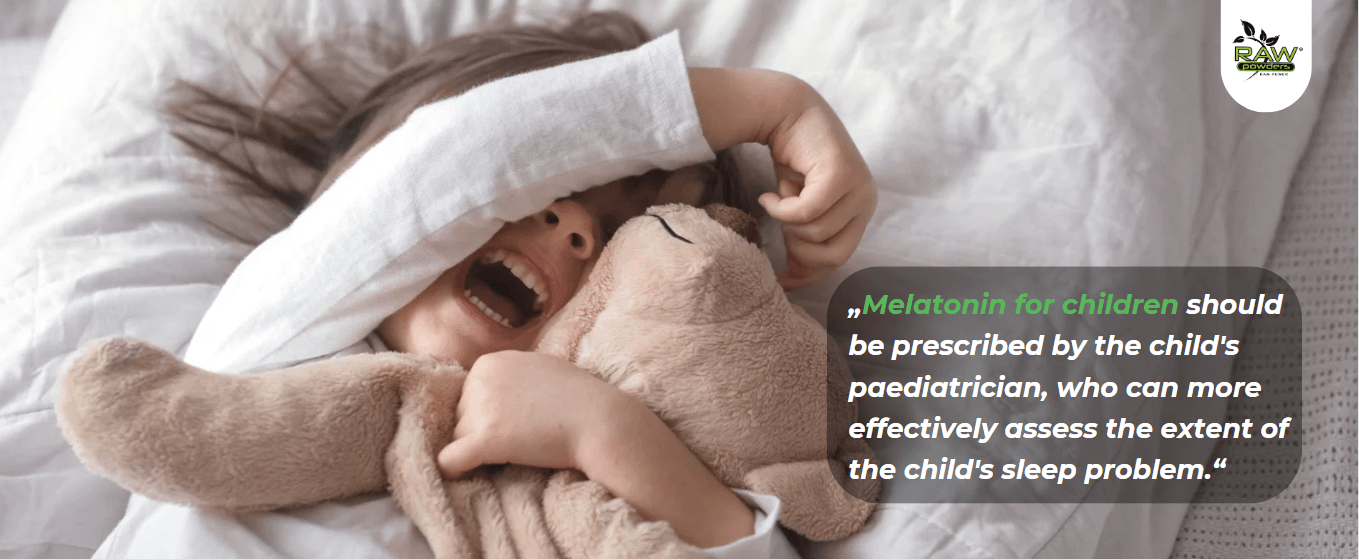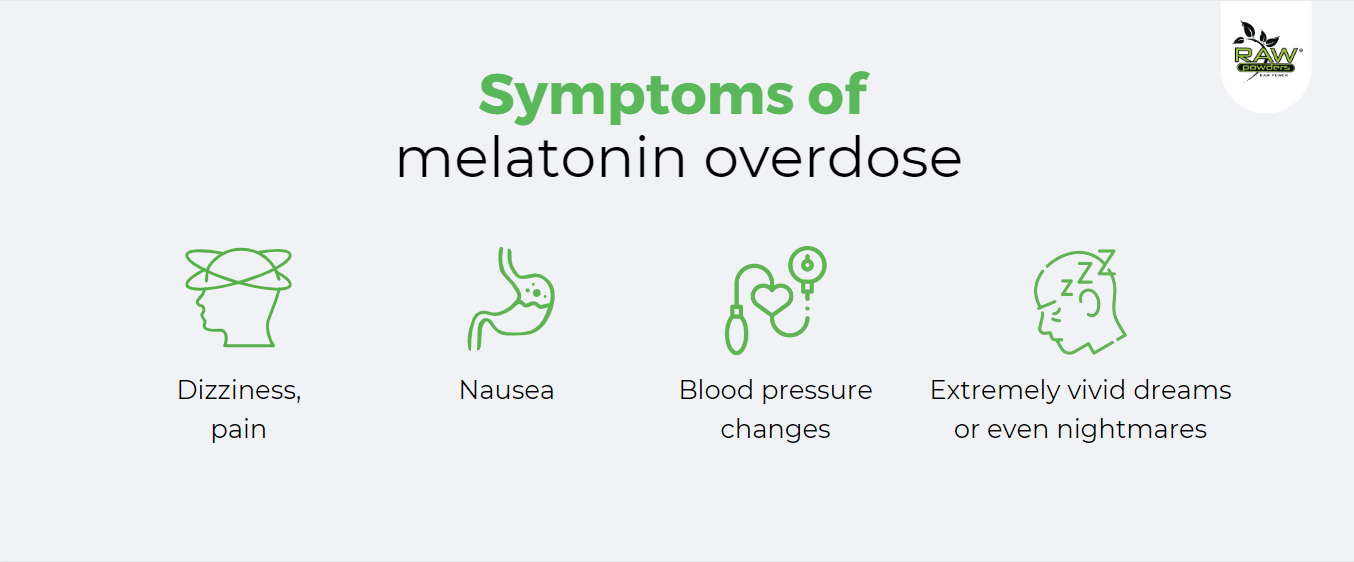MELATONIN DOSAGE: HOW MUCH, WHEN AND WHY I SHOULD TAKE IT

Most people take melatonin supplements for a short period of time to alleviate temporary sleep disturbances, such as those caused by jet lag. Taking melatonin can also help some people, such as those who work shifts or have delayed sleep-wake phase disorders, to reset their internal body clocks and get better sleep. Although melatonin is primarily known as a sleep hormone, melatonin supplements may have functions other than sleep regulation, such as reducing anxiety before surgery [1, 2, 3, 4].
Read more about what melatonin is here.
The natural production of melatonin is often disrupted for a variety of reasons in life, which can negatively affect not only our sleep cycle, but also our well-being, productivity and brain function [5, 6, 7]. Not to mention disorders as serious as insomnia, which can have serious consequences for the body, mind and spirit [8].
- The important role of melatonin as a modulator of sleep is well documented. Melatonin treatment can also entrain the circadian clock and could be helpful in coping with jet-lag and shift-work, as well as be useful in blind subjects, and in individuals with delayed or advanced sleep phase disorders. Administration of exogenous melatonin has been reported to increase sleep quality and length, and decrease sleep latency and the number of wakeful episodes in elderly women with insomnia, as well as significantly improve functioning the following day [9].
- The primary physiological function of melatonin, whose secretion adjusts to night length, is to convey information concerning the daily cycle of light and darkness to body structures. This information is used for the organization of functions, which respond to changes in the photoperiod such as the seasonal rhythms. Seasonal rhythmicity of physiological functions in humans related to possible alteration of the melatonin message remains, however, of limited evidence in temperate areas under field conditions [10].
- One new (2022) meta-analysis on the basis of analysis of 23 clinical trials concludes that, combined data from interventional studies revealed a significant improvement in sleep quality after melatonin intervention. This significant effect was also seen in subjects with respiratory diseases, metabolic disorders, and primary sleep disorders, but there wasn't any significant effect on mental disorders, neurodegenerative diseases, and other diseases [11].
What do I need to know about the amount of Melatonin to take?
In EU are permitted following claims for melatonin in food (including Food Supplements):
- Melatonin contributes to the alleviation of subjective feelings of jet lag [12].
The claim may be used only for food which contains at least 0,5 mg of melatonin per quantified portion. In order to bear the claim, information shall be given to the consumer that the beneficial effect is obtained with a minimum intake of 0,5 mg to be taken close to bedtime on the first day of travel and on the following few days after arrival at the destination.
- Melatonin contributes to the reduction of time taken to fall asleep [13].
The claim may be used only for food which contains 1 mg of melatonin per quantified portion. In order to bear the claim, information shall be given to the consumer that the beneficial effect is obtained by consuming 1 mg of melatonin close to bedtime.
It is best to start with the lowest recommended dose of melatonin for your age. After that, you can gradually increase the dose until you find a dose that will help you fall asleep without causing side effects. Generally, a safe starting dose for adults is 1-5 mg of melatonin. Doses of less than 1 milligram may be effective for older adults. Children should not take melatonin unless recommended by a doctor.
According to the new meta-analysis and systematic review of the safety of Melatonin there have been limited Adverse effects reported from high-dose (≥10 mg)melatonin studies. Based on this limited evidence, melatonin appears to have a good safety profile. Better safety reporting in future long-term trials is needed to confirm this [14].
Symptoms of melatonin overdose may include changes in blood pressure, dizziness, headache, nausea and vivid dreams or nightmares.
To ensure safe use, a doctor should always be consulted before taking any over-the-counter sleep aid including melatonin. Only by knowing your personal medical history can you be best advised on the right dose of melatonin for your needs. Your doctor will also know and assess whether melatonin may interact with other medicines you are currently taking.
Research into the potential benefits and use of melatonin is still evolving and its long-term effects are still not clearly known. Melatonin is known to provide some improvement in sleep problems for many people when taken for short periods. For others, it may cause side effects or have no effect on sleep.
Melatonin dosage for different groups of people
Melatonin dosage for adults
There is no official recommended dose of melatonin for adults, but a dose of 1-5 milligrams is usually effective. Adults can take melatonin a few hours before bedtime. For example, according to the recommendation of NHS (UK authorities), the usual dose is one 2 mg slow-release tablet taken 1 to 2 hours before bedtime. If you have a condition-related sleep problem, a specialist may prescribe melatonin longer term. The usual starting dose is one 2 mg slow-release tablet taken 30 minutes to 1 hour before bedtime.

Melatonin dosage for pregnant or breastfeeding women
Pregnant or breastfeeding women should avoid taking melatonin without consulting their doctor. There are no sufficiently definitive studies on the safety of melatonin in this population.
Melatonin dosage for the elderly
Melatonin levels naturally decrease as a person ages, which can lead to disturbances in the sleep-wake cycle and increased sensitivity to melatonin in many older people. Older adults with dementia should avoid melatonin.
In a meta-analysis of 16 studies, older adults aged between 55 and 77 years were given different doses of melatonin. In all studies, melatonin levels remained higher for longer periods of time in older adults compared to younger adults, leading to increased daytime sleepiness. The more melatonin each person took, the more pronounced this effect was [15].
For this reason, researchers recommend that older people start with as low a dose of melatonin as possible, as small doses can help older people get more sleep without disrupting their circadian rhythms or causing prolonged drowsiness.

Melatonin dosage for children
Parents should consult their child's doctor before prescribing melatonin supplements to children, as the full safety of melatonin supplements has not been fully investigated. The dosage of melatonin for children should be determined by a pediatrician who will assess the extent of the child's sleep problem. Typical doses for treating insomnia in children usually start at 1-2 milligrams.
Medical professionals may recommend melatonin for children with insomnia, autism spectrum disorder or attention deficit hyperactivity disorder. However, there are not enough studies on melatonin in children for experts to determine the official recommended dose or the potential long-term safety risks. As melatonin is a hormone, the use of supplemental melatonin may affect other aspects of children's hormonal development, but further research is needed here.
If your child is having trouble sleeping, discuss your concerns with his/her doctor and look for alternative solutions. Studies show that in half of the cases where melatonin was used to treat insomnia in children, good sleep hygiene was just as effective in alleviating the child's sleep problems.
If you notice that sleep problems persist, it may be helpful to talk to your doctor. He or she can recommend strategies to improve sleep, such as better sleep hygiene, changes in diet and exercise, or cognitive behavioral therapy for insomnia. They can also assess other possible causes of your sleep problems.

Is it possible to overdose on melatonin?
As with all dietary supplements, you should always start with the lowest dose indicated to assess the effects of the substance on the body, as each person reacts differently. Only when the desired effect does not appear after a longer period of time can the dose of melatonin be increased slightly.
The maximum dose of melatonin is 5 mg per day. Exceeding this amount can lead to an overdose. Of course, it is also possible to overdose at lower doses, so you should consult your doctor before taking it.
Unintentional melatonin overdose can be avoided by taking melatonin tablets, which usually contain 1 mg of melatonin per tablet. Melatonin can also be taken in other forms, such as a spray or powder - Raw Powders powder is completely pure, with no additional ingredients; and the spray is very easy to use, with three sprays equalling 1 mg of melatonin.
Is long-term use of melatonin harmful?
Melatonin was approved as a prescription medicine in the European Union for the short-term treatment of sleep disorders in 2007. As an example, here is recordation for EU-registered Circadin (2 mg Melatonin). The recommended dose of Circadin is one tablet a day, taken one to two hours before bedtime and after food. This dose can be continued for up to 13 weeks [16].
Despite the fact that melatonin can nowadays easily be taken in supplement form, we suggest that you first try other methods to improve your sleep rhythm:
- establish your own evening routine
- try to go to bed at the same time every day
- cutting down on coffee, energy drinks and alcohol
- avoiding heavy food in the evening
- try an evening walk or hot bath
- ventilate the bedroom
- meditate
- not using the phone or watching TV before bed
- enjoy the daylight hours in autumn and winter.
Sage, fennel tea or lavender also have a calming effect and promote sleep. If all the above methods do not help, a melatonin supplement may be the solution.
For more information on the benefits of melatonin, see the blog - Benefits and advantages of melatonin.
Can melatonin have side effects if it is not taken according to the recommendations for use?
Side effects are rarely reported when melatonin is used properly. However, an overdose of melatonin may cause side effects such as headache, stomach pain, dizziness and decreased sex drive. There are also reports of unusually vivid dreams. For more on the possible side effects of melatonin, see the blog Side effects of melatonin.
Since melatonin affects our sleep rhythm, the desired sleep-inducing effect can also be detrimental - taking melatonin at the wrong time can cause drowsiness.
The effects of melatonin during pregnancy have not yet been sufficiently studied, so pregnant and breastfeeding women should avoid this supplement. There are also still too few studies on the long-term side effects of melatonin, so a melatonin supplement should always be taken in consultation with a doctor.
Compatibility between melatonin and other supplements
Of course, melatonin supplements can be taken in combination with other products in the Raw Powders range, but it is important to be aware that if melatonin is taken with another stimulant, it may override the effects of melatonin. It is very important for users to consult their physician if they are considering combining supplements or if they have existing health concerns, are on medication, or if they experience any adverse reactions when taking new supplements.
Regulation of melatonin was dependent upon the country of origin [17].
Medical Disclaimer
The information provided in our articles is solely for educational purposes and should not be considered medical advice or instruction. No action or inaction should be taken based solely on the contents of this information. Readers should consult their health care professional on any matter related to their health and well-being. The information and opinions provided here are believed to be accurate and sound, based on the best judgment available to the authors, but readers who fail to consult with appropriate health authorities assume the risk of any injuries. The publisher is not responsible for errors or omissions.
Please be aware that different countries may have specific regulations and that this disclaimer does not replace the need for consultation with a healthcare provider before beginning or changing a treatment or supplement regimen. The information contained in this article is not intended to diagnose, treat, cure, or prevent any disease. Individual results may vary.
References
- Chase, J., & Gidal, B. (1997). Melatonin: Therapeutischer Einsatz bei Schlafstörungen. Annals of Pharmacotherapy, 31, 1218 - 1226. doi: 10.1177/106002809703101015. https://journals.sagepub.com/doi/10.1177/106002809703101015
- MacMahon, K., Broomfield, N., & Espie, C. (2005). A Systematic Review of the Effectiveness of Oral Melatonin for Adults (18 to 65 Years) with Delayed Sleep Phase Syndrome and Adults (18 to 65 Years) with Primary Insomnia. Current Psychiatry Reviews, 1, 103-113. doi: 10.2174/1573400052953556. https://www.eurekaselect.com/article/24807
- Phillips, L., & Appleton, R. (2004). Systematische Überprüfung der Melatonin-Behandlung bei Kindern mit neurologischen Entwicklungsstörungen und Schlafproblemen. Entwicklungsmedizin und Kinderneurologie, 46 11, 771-5 . doi: 10.1017/S001216220400132X. https://pubmed.ncbi.nlm.nih.gov/15540639/
- Andersen, L., Werner, M., Rosenberg, J., & Gögenur, I. (2014). Eine systematische Überprüfung von peri-operativem Melatonin. Anaesthesia, 69. doi: 10.1111/anae.12717. https://associationofanaesthetists-publications.onlinelibrary.wiley.com/doi/10.1111/anae.12717
- Gorfine, T., Assaf, Y., Goshen-Gottstein, Y., Yeshurun, Y., & Zisapel, N. (2006). Schlaf-vorwegnehmende Effekte von Melatonin im menschlichen Gehirn. NeuroImage, 31, 410-418. doi: 10.1016/j.neuroimage.2005.11.024. https://www.sciencedirect.com/science/article/abs/pii/S1053811905024766?via%3Dihub
- Garfinkel, D., Laudon, M., Nof, D., & Zisapel, N. (1995). Verbesserung der Schlafqualität bei älteren Menschen durch kontrolliert freigesetztes Melatonin. The Lancet, 346, 541-544. doi: 10.1016/S0140-6736(95)91382-3. https://www.thelancet.com/pdfs/journals/lancet/PIIS0140-6736(95)91382-3.pdf
- Brown, G. (1995). Melatonin bei psychiatrischen Störungen und Schlafproblemen. CNS Drugs, 3, 209-226. doi: 10.2165/00023210-199503030-00006. https://link.springer.com/article/10.2165/00023210-199503030-00006
- Shochat, T., Haimov, I., & Lavie, P. (1998). Melatonin - der Schlüssel zum Tor des Schlafes... Annals of medicine, 30 1, 109-14 . doi: 10.3109/07853899808999392. https://www.tandfonline.com/doi/abs/10.3109/07853899808999392
- Monika Adamczyk-Sowa, Krystyna Pierzchala, Pawel Sowa, Sebastian Mucha, Izabela Sadowska-Bartosz, Jowita Adamczyk, Marcin Hartel. Melatonin wirkt als Antioxidans und verbessert den Schlaf bei MS-Patienten. Neurochem Res. 2014 Aug;39(8):1585-93. doi: 10.1007/s11064-014-1347-6. Epub 2014 Jun 30. PMID: 24974099 PMCID: PMC4122810. https://pubmed.ncbi.nlm.nih.gov/24974099/
- B Claustrat, J Leston. Melatonin: Physiologische Wirkungen beim Menschen. Review: Neurochirurgie. 2015 Apr-Jun;61(2-3):77-84. doi: 10.1016/j.neuchi.2015.03.002. Epub 2015 Apr 20. PMID: 25908646. https://pubmed.ncbi.nlm.nih.gov/25908646/
- Gholami Fatemeh, Moradi Sajjad, Rasaei Niloufar, Soveid Neda, Setayesh Leila, Mirzaei Khadijeh. Wirkung der Melatonin-Supplementierung auf die Schlafqualität: eine systematische Übersicht und Meta-Analyse randomisierter kontrollierter Studien. Übersicht: J Neurol. 2022 Jan;269(1):205-216. doi: 10.1007/s00415-020-10381-w. Epub 2021 Jan 8. PMID: 33417003. https://pubmed.ncbi.nlm.nih.gov/33417003/
- Verordnung (EU) Nr. 432/2012 der Kommission. Eintrag ID 1953. Nährstoffhaltiges Lebensmittel oder Lebensmittelkategorie: Melatonin. Angabeart Art.13(1). https://ec.europa.eu/food/food-feed-portal/screen/health-claims/eu-register/details/POL-HC-6418
- Verordnung (EU) Nr. 432/2012 der Kommission. Eintrags-ID 1698. Nährstoff Lebensmittel oder Lebensmittelkategorie: Melatonin. Anspruchsart Art.13(1). https://ec.europa.eu/food/food-feed-portal/screen/health-claims/eu-register/details/POL-HC-6419
- Zoe Menczel Schrire, Craig L Phillips, Julia L Chapman, Shantel L Duffy, Grace Wong, Angela L D'Rozario, Maria Comas, Isabelle Raisin, Bandana Saini, Christopher J Gordon, Andrew C McKinnon, Sharon L Naismith, Nathaniel S Marshall, Ronald R Grunstein, Camilla M Hoyos. Sicherheit höherer Dosen von Melatonin bei Erwachsenen: Eine systematische Überprüfung und Meta-Analyse. Review: J Pineal Res. 2022 Mar;72(2):e12782. doi: 10.1111/jpi.12782. Epub 2021 Dec 30. PMID: 34923676. https://pubmed.ncbi.nlm.nih.gov/34923676/
- Esmée M S Vural, Barbara C van Munster, Sophia E de Rooij. Optimale Dosierungen für die Melatonin-Supplementierungstherapie bei älteren Erwachsenen: eine systematische Überprüfung der aktuellen Literatur. Übersicht: Drugs Aging. 2014 Jun;31(6):441-51. doi: 10.1007/s40266-014-0178-0. PMID: 24802882. https://pubmed.ncbi.nlm.nih.gov/24802882/





_front%20(1)-250x250.png)



_front%20(1)-250x250.png)

-(NN)_front%20(1)-min-250x250.png)

_front%20(1)-250x250.png)


_front%20(1)-min-250x250.png)
_front%20(1)%20(1)-250x250.png)
_front%20(1)%20(1)-250x250.png)
_front%20(1)-min-250x250.png)
_front%20(1)-min-250x250.png)
_front%20(1)%20(1)-250x250.png)
_front%20(1)%20(1)-250x250.png)


_front%20(1)%20(1)-250x250.png)
_front%20(1)-250x250.png)
